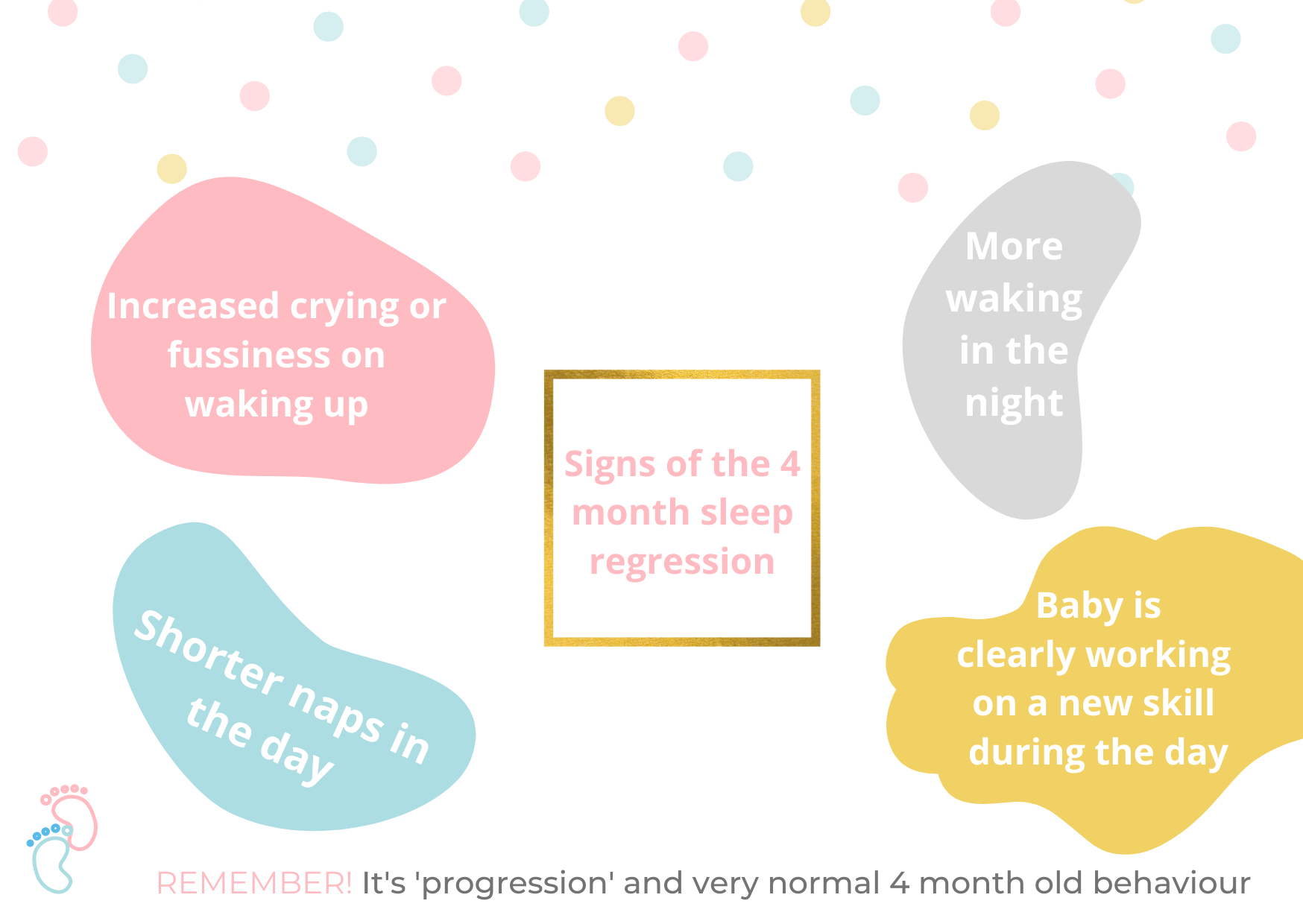4 month sleep regression - signs, solutions and how long it lasts
The 4-month sleep regression is a very real thing - it's hard, it's exhausting but it’s also completely normal and, most importantly, it’s temporary.

The 4-month sleep regression is very real, and an important progression in your baby's development. It's a stage when your baby's sleep pattern shifts, seemingly out of the blue, and they start to wake more frequently at night. It can be difficult to deal with because any established sleep schedule that you had in place can suddenly go to pot.
Picture the scene. You've done everything 'right' to establish your baby's sleep routine. You bought the best baby monitor, read everything you could about how to get a baby to sleep, and even tried out baby sleep training. Finally, it all comes together and your baby is sleeping through the night. Then all of a sudden, without explanation, it all seems to fall apart. Welcome to the 4-month sleep regression.
There are several common sleep regression ages, but the 4-month sleep regression is usually the first time you'll notice a definitive shift in your baby’s sleep patterns. These shifts can include your baby waking up frequently during the night or battling their daytime naps. You may also have more difficulty getting your baby back to sleep, you're not alone in this, many parents wonder when do babies sleep through the night.
It can be difficult and exhausting but - most importantly - it's temporary.
Sleep regression is progression. Your baby’s brain is constantly growing as it adapts to its new environment and learns new skills. Mastering new developmental milestones, such as rolling over or sitting up, cause this 4-month sleep regression. Sleep consultant Sarah Patel tells us, "Try to remember that your baby is struggling to fall asleep because of new and exciting circumstances, such as brain developments."
This article will cover the following elements of the 4 month sleep regression:
- 4-month sleep regression signs
- 4-month sleep regression solutions
- Why do babies have a 4-month sleep regression?
- Do all babies have a 4-month sleep regression?
- How long does a 4-month sleep regression last?
- When to contact your doctor or health visitor
4-month sleep regression signs
- New-found difficulty falling asleep, especially if there doesn’t seem to be an obvious reason behind it, like illness
- More frequent nighttime wakings
- During the daytime, you notice that your baby is working on practising a new skill, like rolling over
- Increased crying or fussiness upon waking
- Reduced overall sleep time
A night or two of unusual wake-ups probably doesn’t count as a regression. This can sometimes be down to teething or just not feeling 100%. We all have the odd night of poor sleep even as adults, and babies are no different.
GoodtoKnow Newsletter
Parenting advice, hot topics, best buys and family finance tips delivered straight to your inbox.
"If a baby doesn’t sleep well for a couple of nights, parents panic and start to drop the R-word almost every month for various reasons," Sarah Patel tells us. "But the 4-month regression is the real deal, and its fallout is permanent. This sleep regression is a progression. It's hard but I see this difficulty in falling asleep as a time that your baby needs your strong support."

Sleep problems among infants are common and normally improve by the time your baby reaches the age of two, according to one recent study. But if you spot the signs above it may well be the four-month sleep regression.
The top three things to remember through the sleepless haze of the 4-month sleep regression are:
- This is totally normal and you're not alone
- You're not to blame - it's progression, not regression
- Sleep is a rollercoaster, not a straight line
The 4-month sleep regression is a normal part of those first few months of life with a newborn. The key to surviving sleep regression is to help your baby to stick with the usual sleep habits. Within three to six weeks, you should both be back to more solid snooze times.
Why do babies have a 4-month sleep regression?
Babies go through the 4-month sleep regression because they are mastering new skills, such as rolling over or finding their hand with their mouth. They process a lot of their day during sleep so their brains are buzzing (this is more theory and not research-based). Evidence supports brain development and a change in sleep patterns - such as when we have busy days at work and struggle to switch off before bed. Babies have sleep problems around this time because their sleep patterns are maturing and their circadian rhythm is forming.
Babies may wake more overnight and have a hard time settling down during the 4-month sleep regression, simply because they are becoming more aware of their surroundings at the same time as developing new skills. A newborn baby needs more deep sleep as they are rapidly growing and developing. At four months this reduces and they take more REM/light sleep and they naturally wake as they transition between these sleep cycles.

Learning to sleep around their own (and very new) sleep cycles create a big impact at four months old. "Younger babies drift relatively easily through sleep cycles," says Beauchamp. "But at four months they have conscious awake time between cycles. This means your baby will have distinct stages of sleep and will go through light sleep before entering deep sleep. [The light sleep] causes tears and grizzling while they learn how to drift back off and sleep through these cycles."
Remember - as with every other tough phase - this will pass. Load up on coffee and energising food and power through, and don't be afraid to ask for help when you need it. - Mum of one, Steph J
Four months is the most well-known sleep regression. Paediatric Sleep Consultant, Francesca Beauchamp told us: "Parents have usually heard of it before they even have their baby. It's when most new clients get in touch with me!"
Sarah Patel agrees, "I hear the term "regression" used frequently when really it's progression. Your baby is learning and growing, definitely not regressing. It just might feel like that."
4-month sleep regression solutions
There are many solutions to surviving a 4-month sleep regression in the short term, such as knowing your baby's sleep cues, keeping a regular sleep routine, calmness and consistency (and maybe extra caffeine for you). Implementing these can help you get through this without developing any unwanted sleep habits.
Sarah Patel, sleep consultant tells us: "As a parent, you need to trust your own instincts. You know your baby better than anyone else. If your baby needs rocking to sleep during this difficult time then do it, you can always peel back the support after the sleep progression is over."
This unfailing support - and showing your baby you are there for them when they need you - will help to build a future framework for healthier sleep as your baby grows. And, while you can’t control whether your little one wakes up during the night, you can do everything in your sleep-deprived power to help her sleep as well as possible.
Follow these tips for dealing with the four-month sleep regression:
- Know your baby’s sleep cues The window of ‘tired’ is a small one, after which babies get overtired and settling them becomes even harder. Get to know your baby’s sleep cues. which can include: rubbing eyes, fussiness, staring into space and looking away from anything stimulating. If you spot any of these get them to bed before they’re overtired. If they’re yawning you may already be too late. When you spot the cues, act fast and get them down to sleep.
- Give your baby time to practice skills in the day Your baby is trying to master new skills, such rolling over. If you see your baby trying to do this in the day give them the time and attention they need, and also help to do it, so that they don't practice at night when they should be getting their rest.
- Stick with your regular bedtime routine Studies show that a consistent routine helps reinforce the message that nighttime is for sleeping. Saying the same line before you leave their room helps, such as 'It's time for sleep'. If you aren’t already, get into the good habit of putting your baby down while drowsy but awake. When your baby is used to falling asleep on her own this will help when she next wakes. Sticking with your usual routine will help to avoid new 'bad' habits.
- Help your baby stay rested Babies aged around 4 months generally need 12 to 17 hours of total sleep, including nighttime and naps. That amounts to between 10 and 12 hours at night, but if she seems tired during the day increase her naps. Settling your baby to sleep at night will be easier if she’s not overtired.
- Keep calm Sleep regressions are exhausting, but they're not forever so try not to worry too much. Stay calm as babies are aware of your energy - you are their world. If your baby requires help to fall asleep - feeding/rocking/cuddling etc - they will look for this help when they naturally wake. Try to work towards your baby falling asleep independently so they are better equipped to do it throughout the night.
Do all babies have a 4-month sleep regression?
No, not all babies have a 4-month sleep regression. Studies show every baby is different and has their own sleep challenges and habits. There really is no 'one size fits all' rule when it comes to sleep. However because the 4-month sleep regression is so infamous, it can be at the forefront of parents' minds.
Tag in your partner whenever you can, even if it's just to sit outside the room and count how many times you've gone in to soothe the baby. - Dad of two, Jake W
Your baby might just have an occasional bad night's sleep at four months; try to avoid immediately worrying that it's a serious sleep regression when it could just be a blip in their routine.
How long does the 4-month sleep regression last
Sleep regression typically lasts anywhere from three to six weeks. (Not for four months, as a new-mum friend once thought.) As sleep regressions go, the four-month sleep regression can be the hardest.
When to contact your doctor or health visitor
A stretch of sleepless nights by themselves aren't usually cause for concern, but you should contact your doctor or health visitor about night wakings if your baby:
- is eating less than normal during the day
- having fewer than four wet nappies and three bowel movements per day
- doesn’t seem to be gaining weight
Once the 4-month sleep regression has passed sleep training can be helpful to help your baby learn how to sleep. At three or four months babies are old enough to learn new sleep techniques. Controlled crying or spaced soothing are sometimes used by parents. Or safe co-sleeping could help; read our guide which explains some of the most popular sleep training techniques.
Related features:
Stephanie has been a journalist since 2008, she is a true dynamo in the world of women's lifestyle and family content. From child development and psychology to delicious recipes, interior inspiration, and fun-packed kids' activities, she covers it all with flair. Whether it's the emotional journey of matrescence, the mental juggling act of being the default parent, or breaking the cycle of parenting patterns, Stephanie knows it inside out backed by her studies in child psychology. Stephanie lives in Kent with her husband and son, Ted. Just keeping on top of school emails/fundraisers/non-uniform days/packed lunches is her second full-time job.